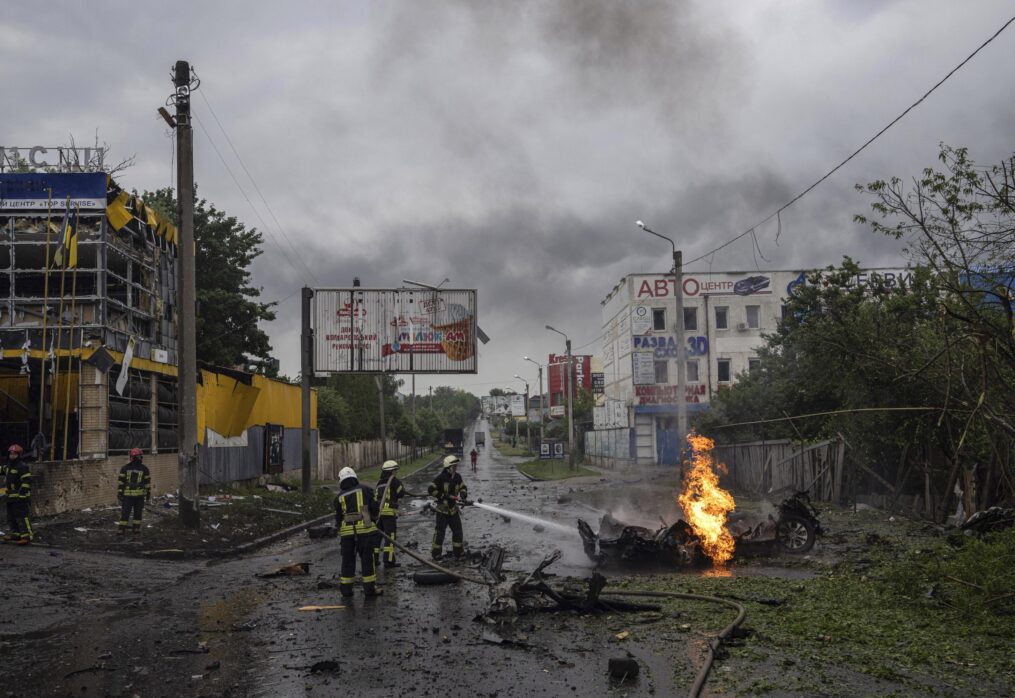Putin extends fast-track Russian citizenship to all Ukraine
KHARKIV, Ukraine (AP) — As Russian missiles struck a key Ukrainian city, Russian President Vladimir Putin signed a decree Monday expanding a fast-track procedure of obtaining Russian citizenship available to all Ukrainians, yet another effort to expand Moscow’s influence in war-torn Ukraine.
Until recently, only residents of Ukraine’s eastern Donetsk and Luhansk regions, as well as residents of the southern Zaporizhzhia and the Kherson regions, large parts of which are now under Russian control, were eligible to apply for the simplified passport procedure.
Ukrainian officials haven’t yet reacted to Putin’s announcement. The decree Monday also applies for any stateless residents currently in Ukraine.
Between 2019, when the procedure was first introduced for the residents of Donetsk and Luhansk, and this year, more than 720,000 people living in the rebel-held areas in the two regions — about 18% of the population – have received Russian passports.
In late May, three months after Russia invaded Ukraine, the fast-track procedure was also offered to residents of the Zaporizhzhia and Kherson regions and a month ago, the first Russian passports were reportedly handed out there.
The Russian passport move appears to be part of Putin’s strategy, which could also involve annexation of territory into the Russian Federation. The Russian president set the stage for such moves even before the invasion, writing an essay last summer claiming Russians and Ukrainians are one people and attempting to diminish the legitimacy of Ukraine as an independent nation.
The passport announcement came as Russian shelling of Ukraine’s second-largest city killed at least six people on Monday and injured 31 others, prosecutors and local officials said. Hours earlier, Russian troops launched three missile strikes on Kharkiv, which one official described as “absolute terrorism.”
Russia’s Defense Ministry said the attacks struck at the points of deployment of the “nationalist battalions.” Kharkiv regional Gov. Oleh Syniehubov said on Telegram that the shelling came from multiple rocket launchers, and those hospitalized for injuries in the attacks included children aged 4 and 16.
“Only civilian structures — a shopping center and houses of peaceful Kharkiv residents — came under the fire of the Russians. Several shells hit the yards of private houses. Garages and cars were also destroyed, several fires broke out,” Syniehubov wrote.
Earlier, he said one of the missiles the Russian forces launched on Kharkiv overnight destroyed a school, another hit a residential building, while the third landed near warehouse facilities.
“All (three were launched) exclusively on civilian objects, this is absolute terrorism!” Syniehubov said.
Kharkiv resident Alexander Peresolin said the attacks came without warning, causing him to lose consciousness.
“I was sitting and talking to my wife,” he said. “I didn’t understand what happened.”
Peresolin said neighbors carried him to the basement, where he later regained consciousness.
The strikes came just two days after a Russian rocket attack struck apartment buildings in eastern Ukraine, killing at least 30 people in the town of Chasiv Yar. A total of nine people have been rescued from the rubble but more are still believed trapped, emergency officials said.
The attack late Saturday destroyed three buildings in a residential quarter used mostly by people who work in nearby factories. Russian Defense Ministry insisted on Monday that the target “in the area of” Chasiv Yar was a Ukrainian territorial defense brigade, and that “more than 300 nationalists” were killed.
Russian attacks have also continued in eastern Ukraine, with Luhansk regional Gov. Serhiy Haidai saying on Monday that the shelling hit settlements on the border with the Donetsk region. Russian forces carried out five missile strikes and four rounds of shelling in the area, he said.
The Luhansk and Donetsk regions together make up Ukraine’s eastern industrial heartland known as the Donbas, where separatist rebels have fought Ukrainian forces since 2014. Earlier this month, Russia captured the last major stronghold of Ukrainian resistance in Luhansk, the city of Lysychansk.
The British military said Monday that Russian troops were being stretched thin. The Defense Ministry tweeted that online videos suggested at least one Russian tank brigade was “mentally and physically exhausted” as they had been on active combat duty since Russia invaded on Feb. 24.
Also Monday, the main Russian gas pipeline to Germany began a 10-day closure for maintenance, heightening European fears that Moscow may not turn the flow back on after its completion. The Nord Stream 1 pipeline runs under the Baltic Sea from Russia to Germany and is the latter’s main source of Russian gas. Gas is usually sent onward to other countries as well. It is scheduled to be out of action until July 21.
German officials are suspicious about Russia’s intentions, particularly after Russia’s giant energy firm Gazprom last month reduced the gas flow through Nord Stream 1 by 60%.
Pledges and supply of Western weapons to Ukraine continued Monday.
In Kyiv, Dutch Prime Minister Mark Rutte told Ukrainian President Volodymyr Zelenskyy during a meeting that his country would supply shells and self-propelled howitzers. Rutte also pledged financial support for Ukrainian teachers, doctors and retirees.
Zelenskyy said he spoke with Rutte about the Netherlands’ potential role in the reconstruction of Ukraine.
___
Jovana Gec in Belgrade, Serbia, contributed to this report.
___
Follow the AP’s coverage of the war at https://apnews.com/hub/russia-ukraine
